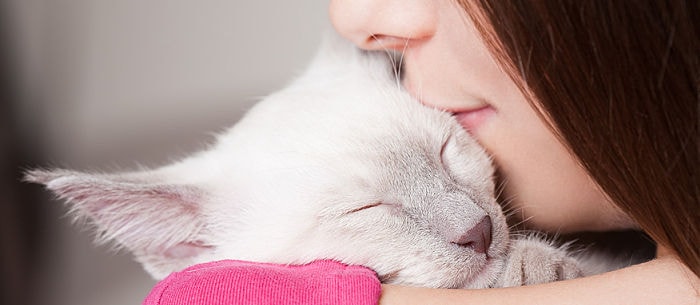Feline infectious peritonitis (FIP) is a scary diagnosis for a cat owner to hear — a fatal virus that attacks many of the cat’s organ systems. Here’s what you should know about FIP in cats and the key symptoms to watch out for.
How It’s Caused
FIP results from a mutation of a seemingly harmless virus: the feline coronavirus. “Many cats are exposed to coronavirus at some point in their early lives or when they are in a shelter,” says Dr. Adam Eatroff, a vet and veterinary internal medicine specialist with BluePearl Veterinary Partners in New York City.
This virus is shed in the feces and transmitted through use of communal litter boxes. It can also be spread through the saliva in contaminated food bowls. It can cause loose stool, but is generally not life threatening. Most cats will recover quickly, and most owners won’t even be aware of it.
However, in a small percentage of cases, the virus will mutate and begin attacking the organ systems. “We don’t know what causes the mutation of the coronavirus to FIP,” says veterinarian Dr. Kimberly Pate with Sunset Veterinary Clinic in Edmond, Ohio. It seems more common in very young or very old cats, those with a poor immune system or cats with a high level of stress (such as a new pet moving into the house or too many pets in the home). It may also be caused by an exaggerated response of the immune system.
Two Types of FIP
There are two forms of FIP — the “wet” form and the “dry” form. “Both forms may cause weight loss, diarrhea, anorexia, dehydration and icterus (yellow membranes and skin),” says Dr. Pate.
However, the symptoms of the two types vary quite significantly from there:
- The “wet” form is characterized by a yellow fluid that accumulates in the abdomen or chest of the affected cat. “Cats with wet FIP have a much shorter survival time compared to cats with the dry form of the disease,” notes Dr. Eatroff.
- The “dry” form is known for masses of inflammatory tissue that form in organs like the lymph nodes and the intestine. It also includes neurological and ocular involvement. Affected cats may become off-balance, have seizures, go blind or develop a hazy appearance in the eyes.
Symptoms
“FIP affects almost every organ, resulting in general signs of illness, such as lethargy, a poor appetite and weight loss, as well as fever,” says Dr. Eatroff. The “wet” form of the disease causes fluid accumulation in the cat’s chest, making it difficult to breathe. Other cats experience liver failure and become jaundiced. Signs you can watch out for include a swollen belly, jaundice (yellow) color to the eyes, skin and gums, and weight loss or poor appetite.
How It’s Diagnosed
FIP is difficult to diagnose, as there is no test that can definitively detect it. “Your veterinarian will form a suspicion based on clinical signs and can run a blood test to screen for coronavirus antibodies. She will also look at enzymatic markers in the blood that indicate kidney and liver damage, and will assess red blood cell and white blood cell lines for abnormalities,” says Dr. Pate. If your cat’s abdomen filled with fluid, your veterinarian may take a sample to check for yellow fluid with high protein content. A combination of these test results with the clinical signs can help your veterinarian come to the suspected diagnosis of FIP.
How It’s Treated
Unfortunately, this devastating disease has no known cure. Immunosuppressive drugs are sometimes attempted to extend the limited time your kitty has left, but these are not very effective. Veterinarians will manage affected cats with supportive care and administer palliative treatment, but sadly, few survive.
Prevention
The most important thing you can do is maintain good hygiene around litter boxes and food bowls if you have multiple cats to prevent spread of the coronavirus, and be wary when leaving your cat with a pet sitter who has cats of their own. Keep an eye out for the symptoms of FIP in cats and contact your vet at the earliest possible sign.
Check out these 11 Signs It’s Time to Take Your Cat to the Vet.
Rebecca Desfosse is a freelance writer specializing in parenting, family and pet care topics.
* This article is for general informational purposes only. It is not intended nor implied to be providing medical advice and is not a substitute for such advice. The reader should always consult a health care provider concerning any medical condition or treatment plan. Neither Care.com nor the author assumes any responsibility or liability with respect to use of any information contained herein.


